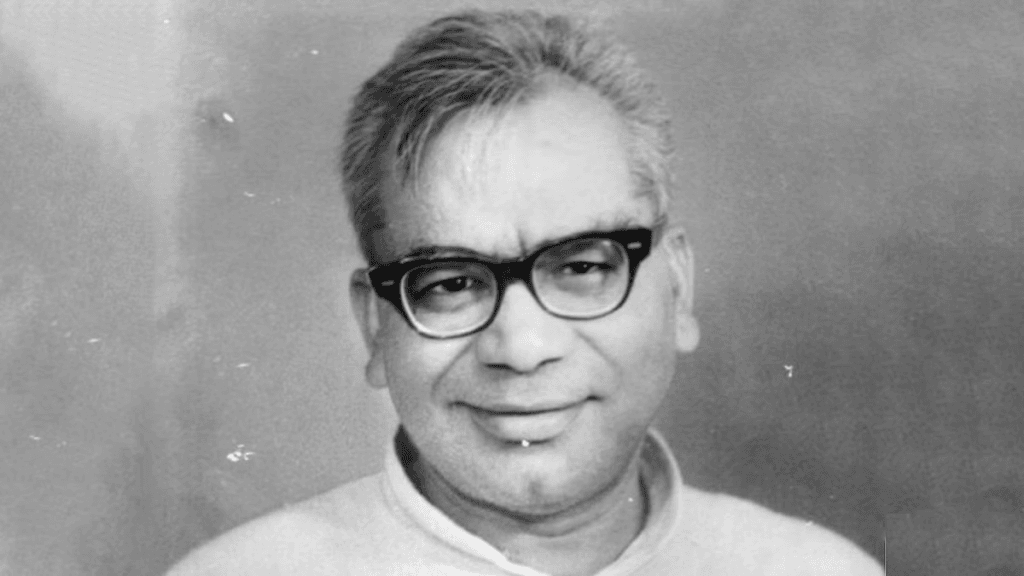RAM MANOHAR LOHIA

Early Life and Education
Ram Manohar Lohia (23 March 1910 – 12 October 1967) was born in Akbarpur, a small town in present-day Uttar Pradesh, India. His father, Hira Lal, was a nationalist and a devoted follower of Mahatma Gandhi, which profoundly influenced Lohia from an early age. Lohia’s mother died when he was just two years old, leaving a deep emotional void. Despite this early loss, Lohia excelled in academics. He attended Banaras Hindu University (BHU) and later pursued higher education in Germany at the University of Berlin, where he earned a doctorate in economics. His thesis on the “Salt Taxation in India” reflected his deep concern for India’s socio-economic issues and its colonial exploitation.
Entry into Politics and Role in the Freedom Struggle
While in Germany, Lohia became involved with the Indian independence movement, establishing contacts with leaders like Subhas Chandra Bose. Upon returning to India in 1933, he joined the Indian National Congress (INC) and became a close associate of Jawaharlal Nehru and Mahatma Gandhi. Lohia played a significant role in the civil disobedience movement, especially during the Salt Satyagraha and the Quit India Movement of 1942. His fiery speeches and writings inspired many, and he was arrested multiple times for his anti-British activities, enduring harsh imprisonment.

Ideological Contributions and Socialist Vision
Lohia was deeply committed to socialism and became one of the founding members of the Congress Socialist Party (CSP) in 1934. He envisioned a society free from caste discrimination, economic inequality, and exploitation. Lohia argued for a decentralized economy, where small-scale industries and self-sufficient villages formed the backbone of India’s development. He strongly opposed capitalism and its inequities while advocating for policies that empowered the poor, women, and marginalized communities.
Break with the Congress and Formation of the Socialist Party
Lohia became disillusioned with the Congress after India’s independence in 1947, particularly with the party’s centralized governance model and its failure to address the issues of poverty and social injustice. He left the Congress in 1948 and became a founding member of the Socialist Party of India. He believed in radical change through peaceful means and introduced the concept of “Four Pillars of Democracy,” emphasizing the importance of decentralized governance at the village, district, provincial, and national levels.
Fight Against Inequality and Caste Discrimination
A staunch opponent of caste discrimination, Lohia advocated for the complete abolition of the caste system. He introduced the idea of “90% versus 10%,” arguing that 90% of India’s population (comprising the poor, backward classes, Dalits, and women) was oppressed by the privileged 10%. His radical stance made him a champion of social justice, and he encouraged affirmative action to uplift marginalized communities. He also emphasized gender equality, urging women to actively participate in political and social reform movements.
Political Opposition and Vision for India
In the 1950s and 1960s, Lohia emerged as a vocal critic of Nehru’s government, particularly its economic policies and perceived authoritarianism. He opposed the Congress monopoly on power, advocating for alternative leadership and greater accountability. Lohia’s slogan “Janata ka paisa janata ke liye” (the people’s money for the people) symbolized his opposition to government extravagance. As a parliamentarian, he was fearless and uncompromising, exposing inefficiencies and corruption while proposing innovative policies for India’s progress.
Legacy and Death
Ram Manohar Lohia passed away on 12 October 1967 in New Delhi following complications from surgery. Though he never held significant political power, his ideas and activism left a lasting impact on Indian politics. He inspired generations of leaders, including those who spearheaded the anti-Congress movements in the 1970s and 1980s. Lohia’s commitment to socialism, equality, and democracy continues to resonate in contemporary Indian politics, with his life serving as a testament to the power of idealism and integrity in public service.
